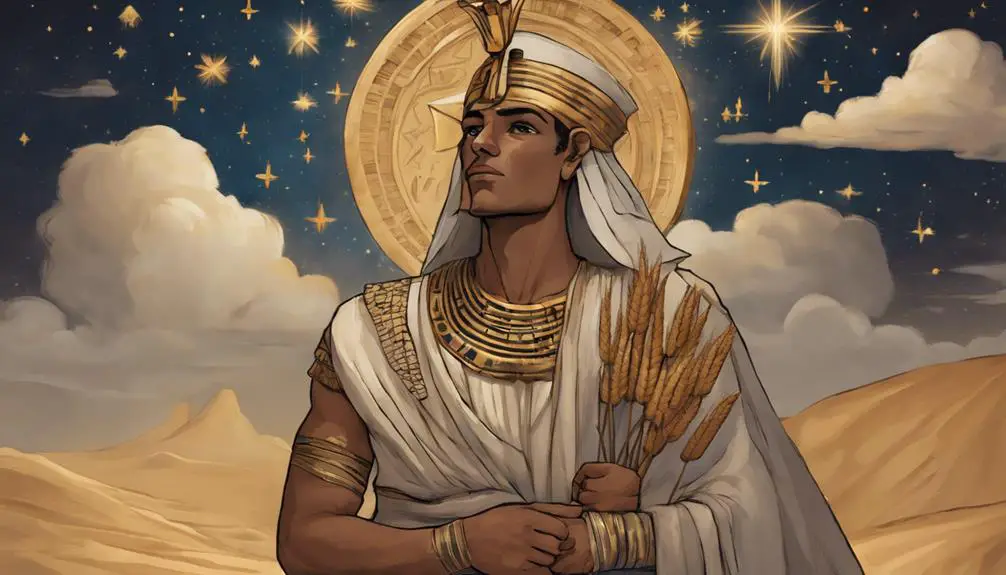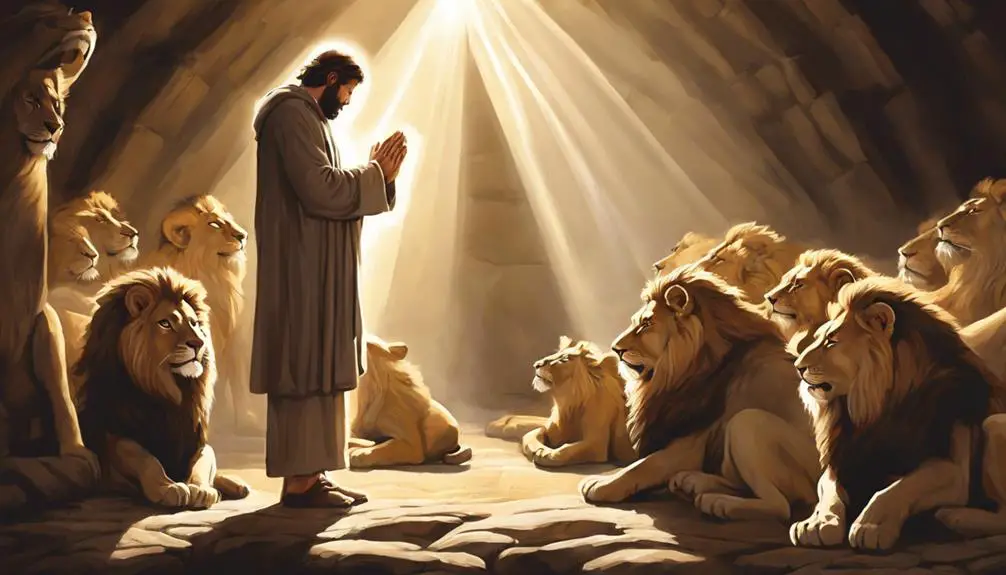Journey through seven biblical tales that reveal hope's power to triumph over despair, inviting you to explore faith's unyielding strength.

7 Stories of Hope in the Bible
As you embark on this journey through the Bible, you'll find that hope isn't just a drop in the ocean; it's a prevailing tide that weaves through the narrative like a golden thread.
From Noah's unwavering faith amidst a world submerged in despair, to Joseph's rise from the depths of a dungeon to the pinnacle of Egyptian power, these stories are beacons of hope in times of darkness.
Each tale, from Hannah's fervent prayer to the miraculous resurrection of Jesus, offers a unique lens through which to view the power of faith and perseverance.
Allow these stories to illuminate the shadowed corners of your understanding, and you might just discover a new perspective on hope's enduring presence in the face of adversity.
Key Takeaways
- Biblical narratives showcase triumph over adversity through unwavering faith and divine intervention.
- Stories of hope illustrate the power of forgiveness, restoration, and redemption in shaping human destiny.
- The resilience of biblical figures in the face of trials emphasizes the transformative impact of persistent faith.
- These tales serve as timeless reminders that divine protection and guidance are available to those who believe and persevere.
Noah and the Ark

In the narrative of Noah and the Ark, the biblical text presents a compelling story of divine judgment and redemption, showcasing humanity's capacity for both destruction and salvation. You're drawn into a world where the moral failings of humanity have reached such a zenith that a divine reset becomes necessary. Yet, within this cataclysmic event, there lies a glimmer of hope and a testament to the resilience of life through the concept of animal preservation.
Analyzing this story, you encounter the meticulous instructions given to Noah, not just for building an ark but for safeguarding the continuity of all living creatures. This aspect of animal preservation serves as a critical juncture in the narrative, highlighting a divine covenant that extends beyond humanity to encompass all of creation. It's a covenant that underscores the interconnectedness of life and the responsibility entrusted to humanity to preserve it.
The ark, in this context, becomes more than a mere vessel of survival; it symbolizes a divine trust and a blueprint for coexistence and mutual preservation among all living entities. This narrative thread not only reflects a divine covenant with Noah but also establishes a foundational ethos for environmental stewardship and the sanctity of life.
As you delve deeper into this story, it's evident that animal preservation isn't an ancillary detail but a pivotal element of the divine covenant. It's a covenant that promises renewal and survival, setting a precedent for future generations about the importance of harmony between humanity and the natural world. Through this lens, Noah's story transcends its ancient origins, offering timeless insights into divine judgment, redemption, and the enduring hope for a restored creation.
Joseph's Rise in Egypt

Shifting our focus to another narrative of resilience and divine favor, we explore Joseph's ascent in Egypt, a story that further illustrates the theme of redemption through the trials and triumphs of an individual's journey. Central to Joseph's political ascent is his extraordinary ability in dream interpretation. Sold into slavery by his brothers and later imprisoned in Egypt, Joseph's journey from the pit to the palace is nothing short of remarkable. His adeptness at interpreting dreams not only saves Egypt from a devastating famine but also positions him as a key political figure under Pharaoh.
Joseph's rise to power is a testament to his unwavering faith and the divine orchestration of his life's path. This narrative encapsulates several key elements:
- The pivotal role of dream interpretation in Joseph's journey.
- The transition from enslavement to a position of immense political power.
- The theme of divine providence guiding an individual's fate.
- The demonstration of resilience in the face of adversity.
- The reconciliation with his family, highlighting forgiveness and restoration.
Joseph's story is compelling for its depth of character development and the intricate weaving of personal and political themes. His political ascent, facilitated by his unique gifts and divine favor, showcases the profound impact an individual can have on a nation's trajectory. Moreover, Joseph's ability to forgive and reconcile with his family adds a rich layer of complexity to his character, making his story not only a narrative of personal triumph but also a powerful example of grace and redemption.
Hannah's Prayer Answered

Moving from Joseph's story of political ascent and familial reconciliation, we now delve into the tale of Hannah, whose fervent prayer for a child was met with divine response, marking another profound instance of hope and faith within the biblical narrative. Hannah's story is emblematic of the infertility struggle faced by countless individuals throughout history and today. Yet, it's her persistent faith amidst despair that elevates her narrative beyond personal triumph to a testament of unwavering trust in divine providence.
Hannah's journey underscores a pivotal theme: the potency of prayer coupled with resilience. Year after year, she returned to the temple, pouring out her soul to God in the midst of her anguish. Her plea wasn't merely a request; it was a vow, promising to dedicate her child to the Lord's service. This aspect of her prayer highlights a crucial facet of biblical hope – it's not passive but engages with God's promises actively and sacrificially.
The resolution of Hannah's infertility struggle, through the birth of Samuel, isn't merely a personal victory; it's a narrative juncture that ushers in significant developments in Israel's history, with Samuel becoming a pivotal figure in the transition from the period of the judges to the establishment of the monarchy. Thus, Hannah's story, while deeply personal, transcends her individual experience, illustrating how persistent faith amidst trials can have far-reaching implications beyond our immediate circumstances.
In essence, Hannah's narrative is a beacon of hope for those enduring the trials of infertility or any form of prolonged waiting. It reassures that persistent faith, coupled with honest supplication, can lead to transformative outcomes, both personally and communally.
Job's Restoration

Reflecting on Hannah's journey of faith and prayer, we now turn our attention to the story of Job and his remarkable restoration, a narrative that explores the depths of suffering and the heights of divine restitution. Job's tale is pivotal for understanding Suffering's Purpose and the significance of Unwavering Faith in the face of adversity. Unlike Hannah, Job's test involves losing everything he holds dear, yet his faith remains unshaken, setting a profound example of patience and trust in God's wisdom.
Analyzing Job's story, we uncover several key points:
- Suffering as a Test of Faith: Job's ordeal underscores the idea that faith must sometimes withstand severe trials.
- Divine Justice and Mercy: His restoration reveals God's ultimate justice and mercy, highlighting that suffering isn't without purpose or end.
- The Role of Repentance and Restoration: Job's narrative emphasizes the importance of humility and repentance in the face of divine rebuke, leading to his eventual restoration.
- The Limitations of Human Understanding: The story invites reflection on the limitations of human wisdom in comprehending divine plans.
- Unwavering Faith Amidst Suffering: Job's unwavering faith, despite his friends' accusations and his own despair, stands as a testament to the power of trust in God's righteousness.
Job's story, rich in lessons, serves as a reminder that suffering, while challenging, can lead to greater spiritual depths and understanding. It calls you to reflect on the purpose behind your trials and the steadfastness of your faith, encouraging a perspective that looks beyond the present to the hopeful restoration that awaits.
David and Goliath

ARTICLE TITLE: Stories of Hope in the Bible
PREVIOUS SUBTOPIC: 'Job's Restoration'
CURRENT SUBTOPIC: 'David and Goliath'
The story of David and Goliath, a foundational narrative in biblical literature, exemplifies the triumph of faith and courage over seemingly insurmountable odds. In this tale, you're introduced to David, the youngest son of Jesse, an unlikely hero chosen by God to face the giant Goliath. Despite his youth and lack of battle experience, David's unwavering faith in God empowers him to confront and defeat Goliath, armed only with a sling and a few stones. This story not only captures the essence of facing giants but also highlights the theme of unlikely heroes rising in the face of adversity.
Aspect |
David |
Goliath |
Significance |
|---|---|---|---|
Stature |
Youthful, inexperienced |
Giant, warrior |
Contrasts physical might with spiritual strength |
Weaponry |
Sling and stones |
Sword and armor |
Symbolizes simplicity and faith over brute force |
Outcome |
Victory |
Defeat |
Demonstrates faith's triumph over fear |
Legacy |
King of Israel |
Symbol of defeat |
Embodies the rise of unlikely heroes |
Analyzing the narrative, it's clear that the story of David and Goliath isn't just about a physical battle; it's a profound illustration of how faith, combined with courage, can enable you to overcome the giants in your life. David's victory serves as a timeless reminder that with faith, no challenge is too great, and no adversary too formidable. This narrative champions the power of belief and the potential within every individual to face their giants, embodying the essence of unlikely heroes.
Daniel in the Lion's Den

Just as David's story illustrates the victory of faith over fear, the narrative of Daniel in the Lion's Den showcases resilience and unwavering trust in God amidst dire circumstances. Daniel's ordeal isn't just a tale of survival but a profound lesson on the power of steadfast faith and the miracles it can usher in through divine intervention.
In this story, you're confronted with a man whose devotion to his faith puts him at odds with the law of the land. Despite the decree that all prayers should be directed only to the king, Daniel's commitment to his faith remains unshaken. He continues to pray to God, an act of defiance that leads him to the lion's den. Yet, it's here, in the face of imminent death, that the true depth of Daniel's faith is revealed.
- Lion's faith: Daniel's unwavering belief in God's protection is a testament to his profound faith.
- Divine intervention: The miraculous safety of Daniel amidst the lions underscores the power of divine intervention.
- Resilience: Despite the threat to his life, Daniel's resilience in maintaining his faith is remarkable.
- Trust in God: Daniel's story exemplifies the importance of placing trust in God, even when circumstances seem insurmountable.
- Test of faith: The ordeal serves as a divine test of Daniel's faith, one that he passes with flying colors.
Daniel's experience in the lion's den teaches that true faith isn't passive but an active, living trust in God's providence. It's a narrative that not only highlights the importance of maintaining faith in the face of adversity but also illustrates how divine intervention can manifest in the most unexpected of ways, proving that with faith, even the lions may become silent.
The Resurrection of Jesus

Among the narratives of hope in the Bible, the Resurrection of Jesus stands as a pivotal event that not only embodies the triumph of divine power over death but also offers profound insights into the nature of faith and redemption. This moment transcends a mere historical event; it's the cornerstone of Christian belief, underscoring the resurrection's significance in theological discourse and its impact on Easter traditions worldwide.
You'll find that the resurrection not only asserts Jesus's divinity but also encapsulates the promise of eternal life for believers. This promise is central to Christian doctrine, offering a lens through which to view suffering, death, and the prospect of an afterlife. It's a narrative that challenges you to consider the depths of faith and the hope it instills against the backdrop of human mortality.
Easter traditions, deeply rooted in this event, serve as an annual reminder of the resurrection's significance. From sunrise services that symbolize the new life emerging from darkness to the symbolic Easter egg representing Jesus's emergence from the tomb, these traditions are imbued with layers of meaning derived from the biblical account.
Analyzing the resurrection in a scholarly context, you're prompted to explore its implications on concepts of justice, sacrifice, and redemption. It's an invitation to delve into the complexities of biblical narratives, understanding them not just as historical accounts but as profound reflections on human nature and divine intervention.
In essence, the Resurrection of Jesus encapsulates a message of hope and renewal, challenging you to reflect on the transformative power of faith and the enduring promise of redemption. It's a narrative that continues to resonate, shaping theological thought and cultural practices alike.
Frequently Asked Questions
How Do Modern Archaeological Findings Support or Contradict the Biblical Stories of Hope?
You might wonder how archaeological findings align or dispute biblical narratives. Ancient inscriptions and geographic parallels often shed light on this topic.
For instance, inscriptions can confirm the existence of locations or figures mentioned in biblical stories, lending credibility to those accounts. Conversely, certain geographic parallels mightn't perfectly align with the biblical narrative, prompting scholars to reevaluate the historical context of these stories.
This ongoing research enriches our understanding of ancient texts.
In What Ways Have These Stories of Hope Been Interpreted Differently Across Various Cultures and Religious Traditions?
You'll find that stories interpreted across diverse cultures and religious traditions often undergo significant transformations. Cultural interpretations and religious adaptations play a crucial role in how these narratives are understood. They're not just retold; they're reimagined to resonate with different audiences.
This process reflects an analytical, scholarly approach to understanding how context influences interpretation. Each culture embeds its values and beliefs, offering a unique lens through which to view these stories.
Can the Themes of Hope Found in These Biblical Stories Be Paralleled With Any Contemporary Real-Life Stories of Overcoming Adversity?
Absolutely, you can draw global parallels between biblical themes of hope and resilience and contemporary real-life stories of overcoming adversity. By analyzing these narratives, you'll find the core themes of hope and resilience are universal, bridging cultural and temporal gaps.
These stories, whether ancient or modern, inspire and offer insight into the human condition, showcasing how individuals navigate challenges with strength and hope, echoing timeless lessons of perseverance and faith.
How Have These Biblical Stories of Hope Influenced Modern Literature, Art, and Cinema?
Exploring how literary motifs and cinematic adaptations draw from biblical narratives, you'll find these stories of hope significantly shape modern storytelling.
They've inspired countless works, infusing literature and film with themes of redemption, resilience, and faith.
What Psychological Impacts Do These Stories of Hope Have on Individuals Facing Personal Crises or Challenges Today?
When you're facing personal crises or challenges, the psychology of hope plays a crucial role in your resilience.
These narratives of overcoming adversity can significantly impact your mental well-being, boosting your optimism and determination.
By internalizing such examples, you're more equipped to navigate hardships with a positive outlook.
Essentially, they serve as psychological anchors, fostering a sense of hope that fuels your journey through tough times.
Conclusion
In analyzing these seven biblical narratives, it's evident that hope acts as a transformative force amidst adversity. Each story, from Noah's unwavering faith amidst a world-engulfing flood to Jesus's triumphant resurrection, underscores a profound truth: despair is never final.
As you've journeyed through these tales, a pattern emerges—an invitation to see beyond immediate trials towards a horizon filled with promise. Yet, the ultimate revelation remains tantalizingly out of reach: what might these ancient echoes of hope teach us about navigating our current struggles?



Sign up